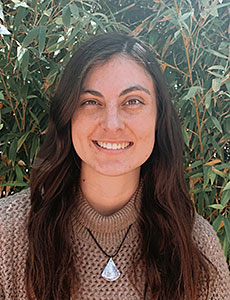Novel constraints on pole-to-equator temperature gradients over the paleocene-eocene thermal maximum
The Paleocene-Eocene Thermal Maximum (~55.8 Ma) was a hyperthermal originating from a major perturbation to the carbon cycle and has been identified as the closest geologic analogue for anthropogenic carbon emissions and warming. However, proxy reconstructions of sea surface temperatures and climate models disagree over the nature of pole-to-equator temperature gradients. In order to evaluate preservation and develop a quantitative correction for recrystallization, I will use electron back-scatter diffraction (EBSD) and secondary ion mass spectrometry (SIMS) analysis. These data will be combined with carbonate clumped isotope analyses (47) and published datasets in order to add to and reevaluate tropical and high-latitude sea-surface temperature estimates and constrain pole-to- equator temperature gradients.
Biography
Growing in San Diego, California, I have always been interested in environmental science. However, it wasn’t until my undergraduate experience at Princeton University that I found my passion for paleoclimate research. While at Princeton I examined early Cenozoic climate through microscopy work with foraminifera and later, working with NOAA’s Geophysical Fluid Dynamics Laboratory, through climate modeling studies. Currently I am part of the Tripati Lab at UCLA pursuing my PhD in Geochemistry. I now use the geochemical “clumped” isotope paleothermometer to reconstruct past climates of the Cenozoic. My research centers on better constraining climate uncertainties in relation to different time intervals, such as the early Eocene “equable climate problem” where model reconstructions and proxy reconstructions disagree on pole-to-equator temperature gradients. Ultimately this research broadens our understanding of Earth’s climate system, which we can then use to better inform our future climate predictions. In addition to research, I strive to make the geoscience community inclusive and am on the board of the Society of Women Geoscientists at UCLA, as well as a fellow of the Center for Diverse Leadership in Science. I am proud to be part of DEI work and public outreach to expand the reach and impact of our scientific community and findings.







